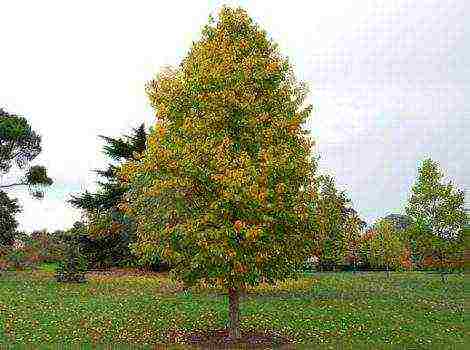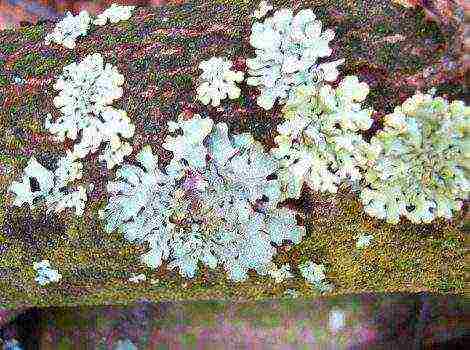Content [show]
What are the types of dried apricots called?
Apricot fruits are attractive to the human diet for their excellent taste and rich chemical composition. Therefore, they are popular in cooking, cosmetology and alternative medicine. Thanks to special technology for harvesting and drying fruits an opportunity is created to use the beneficial properties of the product all year round. In this article, we will talk about dried apricots, what benefits and harms it can bring to human health.
Useful properties and contraindications of dried apricot fruits
In addition to excellent taste, apricot fruits are sources of essential minerals and biologically active substances for the human body. They support the energy potential, protect against many diseases and increase the body's endurance.
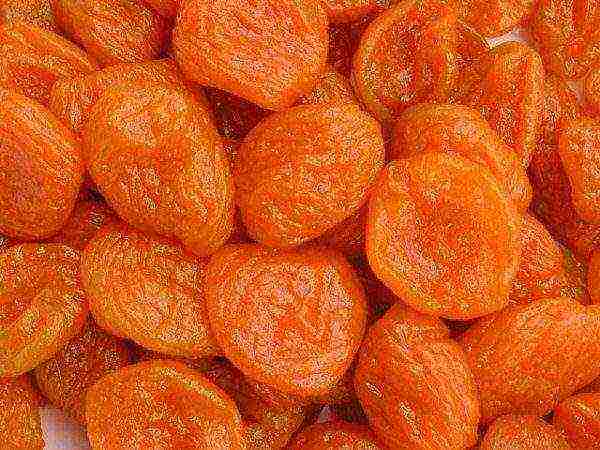
Nutritional value for 100 g:
- proteins 0.9 g;
- fats 0.1 g;
- carbohydrates 9 g;
- dietary fiber 2.1 g;
- water 86.2 g
The energy value 44 kcal.
The easily digestible carbohydrates of fruits are divided into sucrose and fructose. They are quickly absorbed into the bloodstream, after which the central nervous system receives a signal of saturation. This allows you to regulate your appetite, which is invaluable with various weight loss diets.
Due to the content of coarse dietary fiber, apricot fruits have a mild laxative effect., further stimulating intestinal motility. This property is useful for colitis, chronic constipation, and bowel obstruction.
When using 100 g of the product, the body enters:
- potassium 305 mg;
- calcium 28 mg;
- phosphorus 26 mg;
- magnesium 8 mg;
- silicon 5 mg;
- sodium 3 mg.
All these minerals are necessary for the full functioning of a person, especially useful for a growing and worn-out organism with age.
The interaction of potassium and magnesium in the body maintains the tone of blood vessels, prevents thrombus formation, and regulates the rhythm of heart contractions. As a result, the endurance of the myocardium (heart muscle) increases, the work of the heart and the general hemodynamics of the body are stabilized.... Therefore, apricots are recommended for the diet of people with diseases of the heart and blood vessels, as well as hypertension.
The content of iron (0.7 mg) and iodine (1 μg) in apricot fruits make them useful for anemia and thyroid diseases. The antioxidant property of apricot is due to its beta-carotene content (1.6 mg)... The substance inhibits the formation of free radicals, which contribute to the transformation of healthy cells into malignant ones. Therefore, daily consumption of apricot is a good cancer prevention. This property is also useful for protecting the body from the harmful effects of toxins from polluted air.
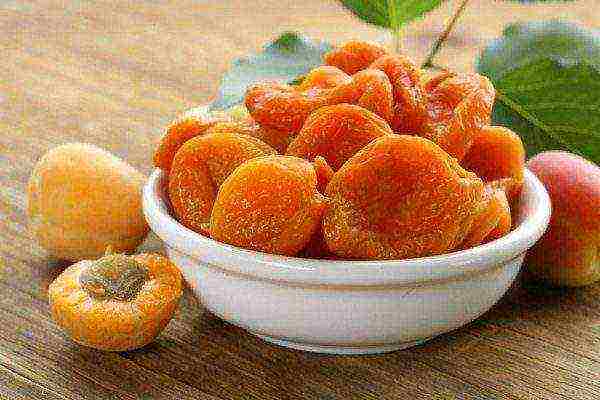
The fruits of apricot contain vitamins C in a significant amount for humans. (10 mg) and E (1.1 mg)... These organic compounds are needed to strengthen immunity, normalize metabolic processes, hematopoiesis, hormone synthesis, and renewal of cells in all structures of the body.
Harvesting and drying, types of dried fruits
The tradition of drying apricots has a long history. Previously, the fruits were dried exclusively in natural ways, leaving them on a tree or laying them out in the sun. Modern manufacturers use special drying equipment and use additional substances that improve the safety of the product. The main suppliers of the product to the Russian market are Turkey and Tajikistan.
There are several types of dried apricot:
- kaisa (called pitted whole fruits);
- dried apricots (halves of fruits);
- apricot (fruit with a stone).
- Kaisa - whole dried pitted apricot fruit
- Dried apricots - dried apricot halves without pits
- Apricot - dried apricots with pits
The process of harvesting dried apricot is quite laborious. The initial phase includes hand harvesting, careful culling and storage prior to processing.
For the production of dried apricots, seeds are removed from the fruit, cut in half and dipped in boiling water for several minutes. This allows you to preserve the useful qualities of the product, to give the skin of the fruit a healthy shine. All apricot halves are connected by hand and laid out in a special thermostat. Here they are blown through with air and dry out. Drying out within 8-10 days, fruits decrease in mass 4-5 times.
Useful properties of dried apricots for the human body
Dried apricots have many advantages over ripe fruits. This is distinguished by the concentrated content of nutrients, the ability to use the product all year round, while the use of fresh fruits is limited by the season. When dried apricot retains 85-90% useful properties... Due to the removal of water, the fruits become more high-calorie (232 kcal), and the content of vitamins and macro- and microelements in 100 g of the product increases 3-4 times.
Application of dried apricots
The daily norm of dried apricot for an adult is 100-150 g... This fully satisfies the daily requirement of potassium, iron and beta-carotene.
Dried fruits are used for treatment and prevention:
- gastrointestinal disturbances;
- diseases of the heart and blood vessels;
- cleansing the kidneys from toxins;
- anemia, anemia;
- hypovitaminosis;
- disorders in the endocrine system;
- hypertension;
- slagging of the body;
- eye diseases.
Regular consumption of dried apricots reduces the risks of heart attack and stroke, the formation of chronic syndromes of renal and heart failure.
The best recipes with dried apricots
In medicinal recipes, you can use dried apricots, kaisa or apricots. It is recommended to soak brightly colored dried fruits in water for 15 minutes.
The use of dried fruits for diseases and disorders of the body:
- Vessels. Dried apricots (5 pcs.), Fruits of hawthorn and rose hips (1 tbsp. L.) Are poured with boiling water (0.5 l) and insisted in a thermos for 10 hours. The filtered infusion is taken in 100 ml 3 times a day before meals. The course of treatment is 14 days. A folk remedy suppresses the processes of thrombus formation, adhesion of cholesterol to the walls of blood vessels.
- A heart. To prepare the medicinal mixture, you will need dried apricots (200 g), raisins (20 g), walnuts (50 g), honey (25 g), lemon juice (1 pc.). Finely chopped ingredients are mixed with honey and lemon juice, mixed in a glass container. The mixture is kept for 3 hours. Take 2 tbsp. l. spoons 1 time per day before breakfast. To improve the heart rate and strengthen the myocardium, you will need to take the drug continuously for a month.
- Constipation... Dried apricots (200 g), raisins (200 g), walnuts (100 g), hay grass (50 g), honey (0.5 l), flaxseed (100 g) are passed through a meat grinder. The mixture is transferred to a glass container and stored in the refrigerator. Recommended daily use of 1 tbsp. l. before breakfast for 5 days.
- Anemia, hypovitaminosis, strengthening of immunity... Dried apricots, prunes, raisins, figs, rose hips (100 g each) are poured with filtered water until completely immersed, soaked for 8 hours. After that, the mixture is passed through a meat grinder. Take 1 tbsp. l. 4 times a day for 1 month. The paste is stored in a glass container in the refrigerator.
- Eyes... Dried apricots (3-4 pcs.) Are poured with boiling water (0.5 l), insisted for 3 hours. Take 3 times a day, 100 ml. The infusion will help strengthen the blood vessels of the eyes. The same recipe will be useful for disorders in the endocrine system.
- Cleansing the kidneys and the body. Dried apricots (10 pcs.) Are poured with boiling water (1 l) and insisted for 10 hours. 100 ml of infusion is consumed before breakfast, the rest of the volume is distributed for intake throughout the day, gradually eating the fruits. The cleansing course lasts 3 weeks, during this period products of animal origin are excluded.
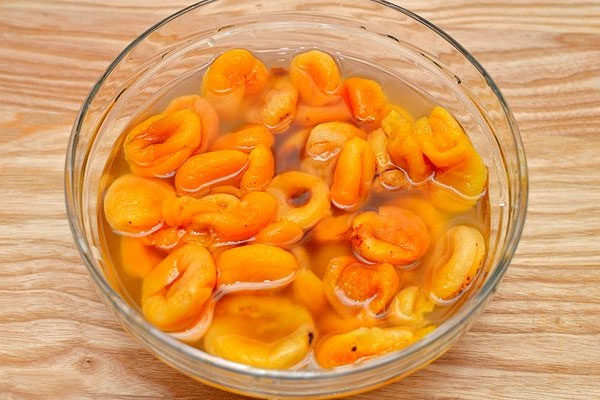
To prevent urolithiasis and strengthen the body, compote will be useful... It is very easy to cook it. For this, peeled and washed dried apricots (300 g) are poured with water (2.5 l) and cooked for no more than 6-7 minutes over low heat. To make the drink more useful, sugar is replaced with natural honey. Compote will be useful for the daily diet of people of different ages.
The benefits and harms of the kernel of apricot kernels
Inside the apricot kernels, there are kernels that taste like almonds, which are used in many countries to prepare delicious dishes.
Macronutrients in apricot kernels (100 g):
- magnesium 196 mg;
- phosphorus 461 mg;
- potassium 802 mg;
- sodium 90 mg;
- calcium 93 mg.
Iron content 7 mg. The vitamin composition of the product is represented by niacin (RR) 4.15 mg. Energy value of the product 502 kcal.
Apricot kernels are widely known for their oil, the content of which reaches up to 60%. The main beneficial properties of apricot kernels are associated with fatty acids: palmitic, oleic and linoleic. They have anti-inflammatory and antiarrhythmic properties, lower cholesterol levels, and have a beneficial effect on the nervous system. Apricot kernels are a unique complex consisting of fatty acids and macronutrients for the treatment of cardiac and vascular pathologies.
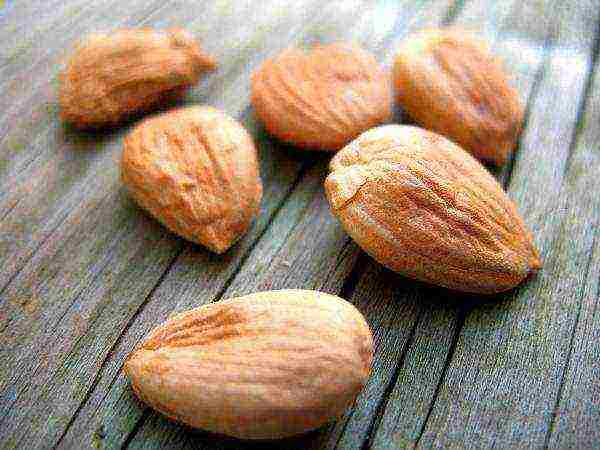
Apricot kernels contain dietary fiber that absorbs toxins in the intestines. It is useful for healthy microflora, the imbalance of which becomes the cause of dysbiosis.
The composition of apricot kernels contains benzaldehyde, which has analgesic properties. Regular use of the product relieves painful sensations in arthritis, arthrosis and rheumatoid diseases... The anti-inflammatory and mucolytic properties of the nuclei help in the treatment of acute respiratory viral infections, influenza, bronchopulmonary diseases, and nephritis.
The nuclei contain amygdalin (IN17)... The organic compound, upon contact with malignant cells, decomposes into hydrocyanic acid and benzaldehyde, substances with strong carcinogenic properties. Therefore, the product is often included in diet therapy for people with malignant tumors.
The composition of apricot kernels has a toxic effect on helminths. Traditional medicine recommends using them as an anthelmintic..
Healing recipes
To strengthen immunity and prevent heart disease, apricot kernels can be included in the daily diet without processing. In this case, it is important to know: adult daily allowance 20 gand children 10 g... With an increase in the recommended amount, the harmless threshold of amygdalin for the body will increase. This can result in poisoning.
Recipes:
- Arrhythmia. Crushed kernels (20 pcs.), Grated lemons (0.5 kg), honey (0.5 l) are mixed and kept in a cool place for 2 days. The mixture is taken in 1 tbsp. l. before breakfast and before dinner. The course of treatment is 14 days.
- Dry cough. Fried kernels (250 g) are poured with water (0.5 l) and boiled for 1 hour. After that, walnut kernels (250 g) are added, the liquid is evaporated, honey (0.5 l) is added and kept on low heat for 3 minutes. The mixture is taken on an empty stomach 2 times a day for 1 tsp. until the condition is relieved.
- Airway inflammation. Dried kernels are ground into powder. For use, the powder is dissolved in warm milk, distributing 20 g of the product for the whole day.
- Dermatitis. To reduce inflammation, relieve itching and soften crusts, you need to lubricate problem areas with apricot oil 3 times a day.
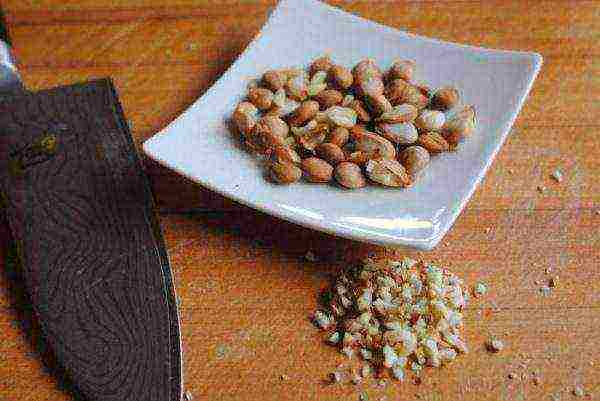
With helminthiasis daily consumption of raw apricot kernels is recommended, which increase the toxic effects of the main drugs.
Apricot kernels not recommended for people with hypersensitivity of the body... In case of chronic pathologies, a doctor's consultation is necessary.
The widespread use and significant properties of apricot for humans allows it to be considered as a valuable culture. Apricot is of industrial importance for many countries, is mastered by amateur gardeners, and the assortment of culture is constantly being improved by breeders. Therefore, we can enjoy fruits of different flavors and purchase a quality product.
